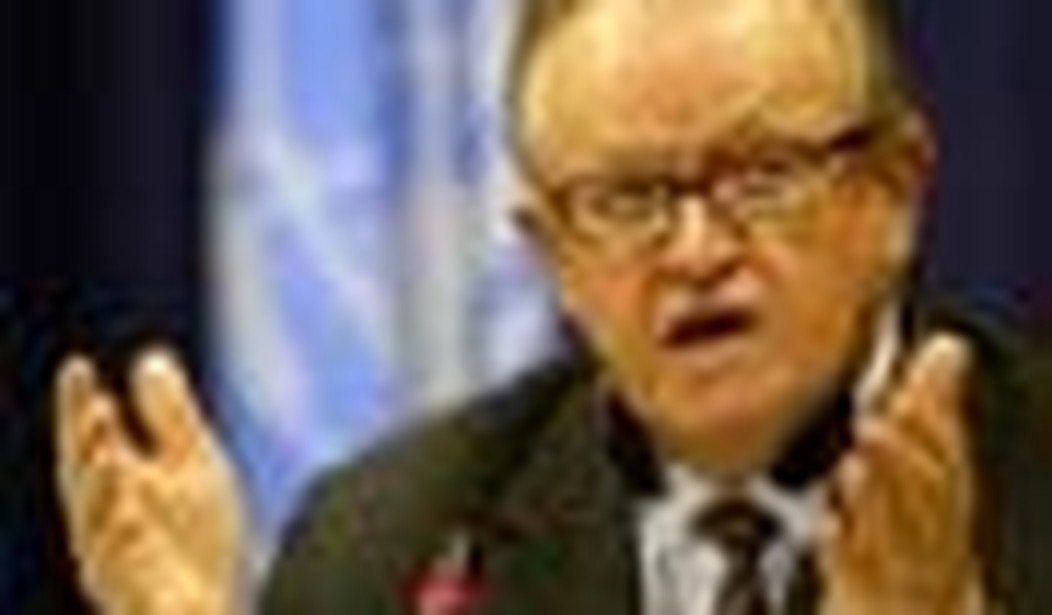The Nobel Peace Prize committee has returned to its roots — at least if the Associated Press is to be believed. Commenting on the committee’s selection of the former president of Finland, Martti Ahtisaari, as this year’s Nobel laureate, the AP wrote: “By selecting Ahtisaari, 71, a seasoned conflict mediator, the Norwegian award committee returned to honoring traditional peace work after years where they recognized accomplishments in economics and safeguarding the environment.” Now, it is certainly true that the Nobel committee has in recent years made a practice of bestowing the award upon persons and/or organizations whose accomplishments, such as they are, bear no evident connection to matters of war and peace. Last year’s award to Al Gore and the Intergovernmental Panel on Climate Change was only the most recent in a whole series of puzzling choices in this regard.
But on closer inspection the choice of Ahtisaari is no less puzzling and hardly any more “traditional.” Traditionally — i.e., when the bestowal of the prize really did have something to do with peace — the idea was to bestow it upon persons and/or organizations that had actually contributed to achieving or fostering the latter in a concrete situation of conflict: notably, for instance, political leaders who had negotiated or championed peace agreements among hitherto warring parties. Think, for instance, of the 1994 award to Yitzhak Rabin and Shimon Peres, on the one hand, and Yasser Arafat, on the other, following the signing of the Oslo Accords.
Martti Ahtisaari, however, is best known for having his name attached to an agreement — the famous “Ahtisaari Plan” for the final status of Kosovo — to which the concerned parties, Serbia and the formerly merely provisional government of Kosovo, never in fact agreed. In the meanwhile, that plan is quite simply being imposed on one of the parties: namely Serbia, which has thereby seen a large chunk of its territory forcibly removed from its authority. (On the history and details of the “Ahtisaari Plan,” see my December 2007 article “Ahtisaari or Bust.”)
Of course, de facto Kosovo was already removed from Serbian or then Yugoslav authority in June 1999, when, following more than two months of NATO bombing, the Yugoslav government agreed to withdraw its security forces from the then-Serbian province and to allow the province to be occupied by the NATO-led force that would come to be known as KFOR. The initial KFOR deployment comprised some 50,000 troops — this for a territory whose population at the time numbered some two million people. To get an idea of the massiveness of this deployment, consider that a proportionate force deployment in the ten-times-more-populous Iraq would comprise some 500,000 troops: roughly three times the number of foreign troops that are actually in Iraq today. According to the latest official figures available from NATO, KFOR troop levels in Kosovo are currently at nearly 16,000 troops, roughly proportionate to current coalition troop levels in Iraq. Without the presence of these troops, needless to say, there would be no “Ahtisaari Plan.” The plan makes specific provision for the NATO-led “international military presence” to remain in Kosovo — indefinitely.
The conditions for the cessation of the NATO bombing campaign were laid out in a document presented to the Yugoslav government on June 2, 1999, by an envoy of the European Union. (See UN Security Council document S/1999/649.) That envoy was none other than Martti Ahtisaari. Upon Yugoslavia’s acceptance of the conditions, the document was then forwarded to the UN Security Council by the then-German presidency of the EU. Viktor Chernomyrdin, serving as an envoy of Russian President Boris Yeltsin, was also associated with the démarche. But the practically nullity of Chernomyrdin’s presence is obvious at first glance. As Russia was not involved in hostilities with Yugoslavia and in fact opposed the NATO bombing campaign, it could hardly have set conditions for the cessation of such hostilities.
Whatever one might think of NATO’s 1999 war on Yugoslavia, the fact of the matter is that Martti Ahtisaari never “negotiated” any peace for Kosovo and he was in no position to serve as “mediator” in the Kosovo conflict. NATO was, of course, a party to the conflict. NATO won. And it was via Martti Ahtisaari that the NATO countries dictated their terms to the defeated Yugoslavia. It will be of particular interest to Americans that he did so as a representative of the European Union — as if the American air forces that carried out the bulk of the sorties during the bombing campaign had, in effect, been “on loan” to the EU.
The choice of Martti Ahtisaari as Nobel Peace laureate does more to undermine the traditional sense of the Nobel Peace Prize than any merely irrelevant choice like Al Gore. For by awarding the prize to Martti Ahtisaari, the Nobel committee has sent the message that to achieve peace, one should make war.









Join the conversation as a VIP Member